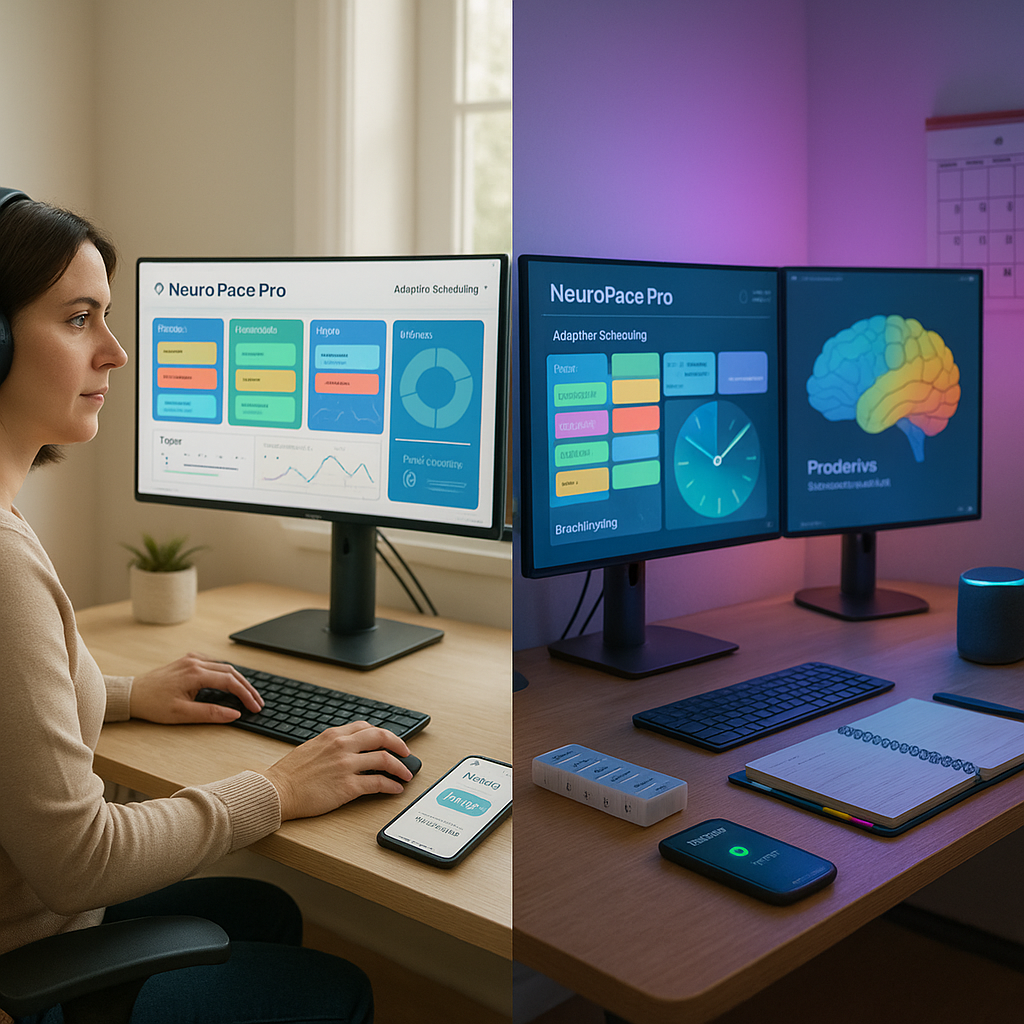Key Takeaways
- Custom AI streamlines workflows: Tailored automation tools help manage deadlines, minimize overwhelm, and reduce context-switching for ADHD brains.
- Hyperfocus becomes an asset: AI task planning channels intense concentration into business growth rather than burnout.
- Authentic systems over generic hacks: Lived experience demonstrates that neurodivergent-led strategies outperform one-size-fits-all productivity advice.
- AI supports creativity and scalability: Automated systems let professionals focus energy on innovation, enabling sustainable project growth.
- Momentum for neuroinclusive workplaces: Demand is rising for tech solutions and consulting that respect and elevate diverse thinking styles.
Introduction
AI assistants and custom automation tools are rapidly transforming the landscape for neurodivergent professionals, particularly those with ADHD and on the autism spectrum. By addressing challenges such as overstimulation and loss of focus, these technologies are enabling users to turn difficulties into practical strengths. As adoption grows, individuals are discovering innovative approaches to managing work, unlocking creativity, and building momentum for inclusive, sustainable careers.
AI Tools as Cognitive Scaffolding
AI assistants are changing how neurodivergent professionals meet workplace challenges by offering flexible, personalized support systems. These tools provide adaptive scaffolding that aligns with individual cognitive styles, rather than imposing neurotypical workflows.
Sarah Chen, an ADHD software developer at Microsoft, stated that she uses AI-powered task management systems to maintain focus during complex coding sessions. According to Chen, the AI recognizes her natural work patterns and supplies timely interventions when she may lose momentum.
Recent studies by the Neurodiversity at Work Institute indicate that AI-assisted workflows can decrease task-switching stress by up to 45% for neurodivergent professionals. This technology acts as an external executive function system. It effectively manages transitions and priorities in accordance with diverse cognitive approaches.
Customization and Pattern Recognition
Machine learning algorithms excel at recognizing and adapting to individual work patterns, making them particularly valuable for neurodivergent professionals. These systems can identify optimal productivity periods and adjust notification timing and task scheduling accordingly.
For example, Focusmate’s AI companion analyzes users’ natural work rhythms and suggests break intervals based on each person’s energy patterns. Alex Rivera, an autistic marketing consultant, reported that the AI does not force a neurotypical schedule, but instead helps leverage hyperfocus productively.
Many platforms now include customizable sensory settings, allowing users to personalize notification sounds and visual layouts. This level of customization supports, rather than overrides, natural cognitive preferences and helps create environments that foster productivity.
Real-World Applications
Major companies such as IBM and Google are deploying AI-powered workplace accommodations benefiting neurodivergent employees. These tools include smart meeting schedulers that account for sensory processing needs, and AI writing assistants that structure complex communications.
The emerging category of cognitive assistance AI has shown strong results in project management. These systems help break projects into manageable tasks while maintaining the broad perspective that many ADHD professionals possess.
Dr. Jamie Kohn, a leading neurodiversity advocate, noted that AI tools are shifting workplace dynamics by adapting to human neurodiversity instead of requiring people to conform to rigid systems.
Integration and Accessibility
Organizations integrating AI tools for neurodivergent professionals report improved collaboration and communication within teams. The technology bridges cognitive differences and facilitates more effective partnerships.
Cloud-based AI platforms have made these solutions more accessible to small businesses and independent professionals. Monthly subscriptions, generally ranging from $20 to $200, bring advanced cognitive support within reach for a broader audience.
To ensure security and integration, IT departments are developing best practices. Experts emphasize data privacy while enabling AI assistants to learn from behavioral patterns.
Future Developments
Research teams at Stanford’s NeuroTech Lab are developing next-generation AI systems that respond to subtle indicators of cognitive state. These advancements aim to provide more intuitive support by recognizing early signs of overwhelm or attention shifts.
Open-source initiatives are also gaining traction. The NeuroInclusive Design Coalition, founded by autistic tech professionals, is working on guidelines to make AI tools accessible for a wider range of cognitive needs.
Industry analysts forecast significant growth in the neurodivergent-focused AI tools sector over the next five years. Since 2021, investment in these technologies has tripled. This reflects greater recognition of neurodivergent professionals’ workplace contributions.
Conclusion
AI tools are redefining productivity for neurodivergent professionals by offering adaptive support that respects personal rhythms and strengths rather than rigid standards. As these platforms become more feature-rich and accessible, workplaces are evolving toward greater inclusion and sustainable success.
What to watch: new guidelines from neuroinclusive design initiatives and innovative developments from research labs pursuing next-generation, intuition-driven AI support.





Leave a Reply